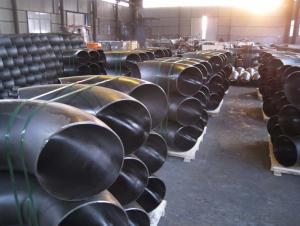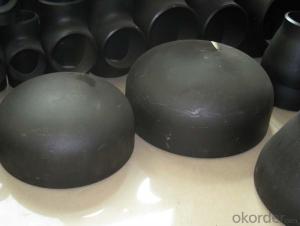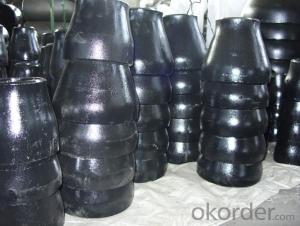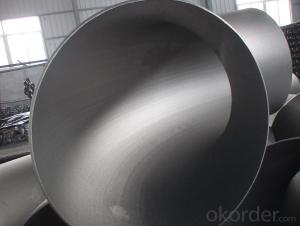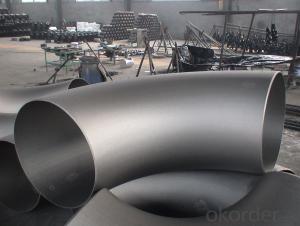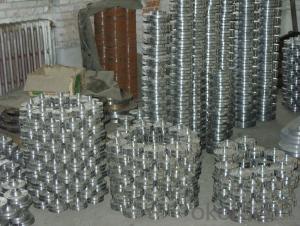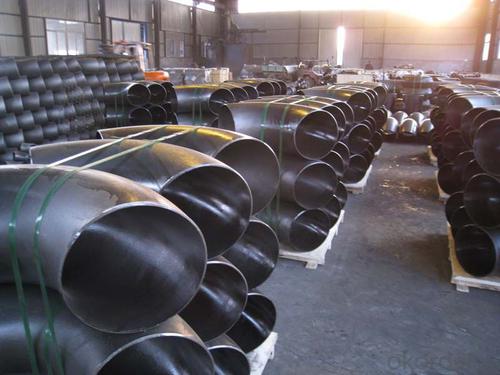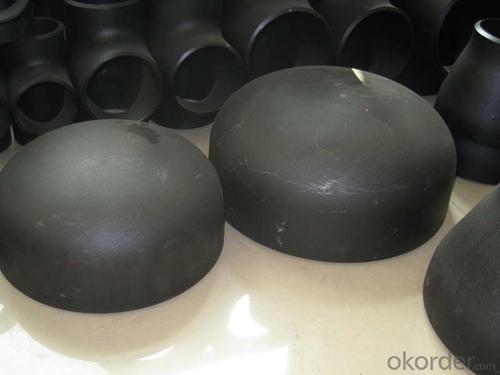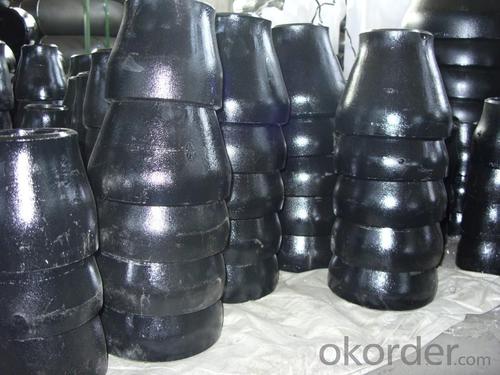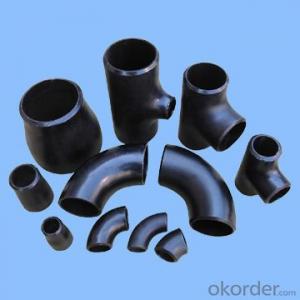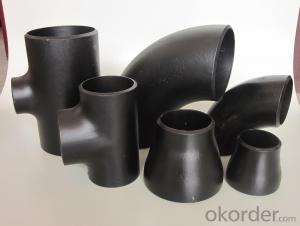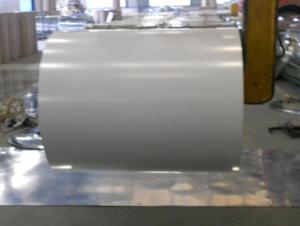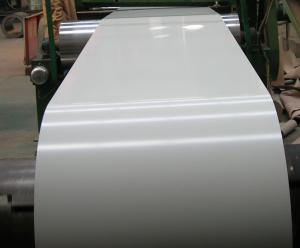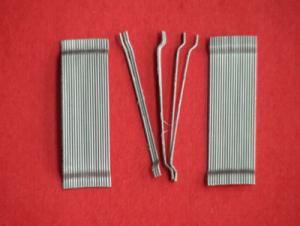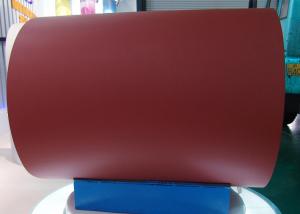Carbon Steel Pipe Fittings ASTM A234 FLANGE
- Loading Port:
- China Main Port
- Payment Terms:
- TT OR LC
- Min Order Qty:
- -
- Supply Capability:
- -
OKorder Service Pledge
OKorder Financial Service
You Might Also Like
Specifications
pipe fitting elbow
Certificate:ISO:9001-2000
New material,completely meet asme and din standard
Best price
1. type: AISI ASTM A234 WPB BW Con Elbow
2. Size: 1/2"-48"(1/2"-24"is seamless and 26"-48"is welded)
3. Wall thickness: sch10-160, STD, XS, XXS
4. Material: A234WPB, A420WPL6, A420WP5, WP11, WP12, WP22, etc
5. Welding line: seamless
6. Angle of bend: 30, 45, 90, 180degree
7. Bending radius: SR, LR
8. Standard: ANSI B16.9, JIS, SB, DIN, GB
9. Surface treatment: black paint, vanis paint, black rust-proof oil,
transparent oil, hot galvanizing
10. Application: petroleum, electricity, chemical, natural gas, metallurgy,construction,
shipbuilding and other fields because of its high pressure, high temperature, etc
11. connection: welding
12. technics:forged
13.Certificate:ISO9001 - 2000, CE, SGS, etc.
14. packaging: wooden case, pallet, container or in accordance with the
requirement of customers
15. Principle: quality fist, customer first, credit first
16. payment: L/C T/T
17. delivery time: 7-25 days after payments
18. Notes: the bevel can be made in accordance with the special requirements
of the customers
19. Others: we can also produce the products according to the requirements
of the customers
The main production:
1. PIPE FITTINGS: elbows, tees, bends, reducers, cap, flanges and sockets etc.
2. PIPE: bult welded pipes, seamless pipes, threaded pipes, etc.
We sincerely welcom customers at home and abroad to visit us and seek common development.
- Q: How do steel products contribute to the hospitality and tourism industry?
- Steel products contribute to the hospitality and tourism industry in various ways. Firstly, steel is widely used in the construction of hotels, resorts, and other accommodation facilities, providing a strong and durable structure. It ensures the safety and longevity of these buildings, attracting tourists and enhancing their overall experience. Additionally, steel is utilized in the fabrication of furniture, fixtures, and equipment in hotels and restaurants, offering a modern and sleek aesthetic that appeals to guests. Steel also plays a vital role in the transportation sector, with steel-made vehicles and infrastructure supporting the efficient movement of tourists and goods, facilitating tourism growth. Overall, steel products contribute significantly to the hospitality and tourism industry by providing essential infrastructure, enhancing aesthetics, and enabling smooth transportation.
- Q: What are the advancements in steel product technology and materials?
- Advancements in steel product technology and materials include the development of high-strength steels, advanced alloy compositions, and improved manufacturing processes. These advancements have led to stronger and more lightweight steel products, increased durability and corrosion resistance, and improved performance in various applications such as automotive, construction, and aerospace industries. Additionally, advancements in steel processing techniques, such as hot rolling, cold rolling, and heat treatment, have allowed for greater precision and control over the properties and characteristics of steel products.
- Q: How is steel used in the agricultural industry?
- Steel is commonly used in the agricultural industry for various purposes such as constructing buildings, barns, and storage facilities, manufacturing agricultural equipment like tractors, plows, and harvesters, as well as fencing and irrigation systems. Its strength, durability, and resistance to corrosion make it an ideal material for these applications, ensuring the longevity and efficiency of agricultural operations.
- Q: What are the advantages of using stainless steel in the food and beverage industry?
- There are several advantages of using stainless steel in the food and beverage industry. Firstly, stainless steel is highly resistant to corrosion, which means it can withstand exposure to water, chemicals, and acidic substances commonly found in food and beverages. This makes it a hygienic choice and prevents contamination of the products. Secondly, stainless steel is easy to clean and maintain, reducing the risk of bacterial growth and ensuring food safety. Additionally, stainless steel is a durable material that can withstand high temperatures, making it suitable for various cooking and processing applications. Lastly, stainless steel is aesthetically pleasing, giving a modern and professional look to food and beverage equipment and fixtures.
- Q: What are the different types of steel chains and their applications?
- There are several types of steel chains, each designed for specific applications. Some common types include: 1. Proof coil chains: These are general-purpose chains used for towing, securing loads, and restraining objects in various industries. 2. Grade 30 chains: Also known as Grade 30 proof coil chains, these are commonly used in light-duty applications, such as agriculture, construction, and general-purpose lifting. 3. Grade 43 chains: These chains have higher tensile strength than Grade 30 chains and are suitable for heavier-duty applications, including transportation, logging, and towing. 4. Grade 70 chains: Known as transport chains, these chains are specifically designed for securing cargo on trucks, trailers, and flatbeds. They have a higher strength-to-weight ratio, making them ideal for load binding. 5. Grade 80 chains: These chains are mostly used in lifting applications due to their high strength and durability. They are commonly found in construction, mining, and oil and gas industries. 6. Grade 100 chains: These chains have the highest tensile strength and are primarily used for heavy-duty lifting and rigging applications. They are commonly seen in shipyards, steel mills, and offshore operations. 7. Stainless steel chains: These chains are resistant to corrosion and are suitable for applications where exposure to moisture or chemicals is a concern. They are commonly used in food processing, marine environments, and medical equipment. Overall, the choice of steel chain depends on the specific application requirements, load capacity, environment, and desired level of durability.
- Q: What are the properties of stainless steel for medical equipment?
- Stainless steel for medical equipment exhibits several key properties such as high corrosion resistance, excellent strength and durability, good heat resistance, and ease of sterilization. It is also non-reactive, biocompatible, and resistant to bacteria growth, making it a suitable material for surgical instruments, implants, and other medical devices.
- Q: How are steel bars used in the reinforcement of dams and reservoirs?
- Steel bars, also known as reinforcing bars or rebars, are commonly used in the reinforcement of dams and reservoirs. These bars are strategically placed and embedded within the concrete structure to enhance its strength and durability. By providing tensile strength, steel bars help prevent cracking and structural failure caused by extreme pressure or environmental factors such as water pressure and seismic activity. The steel bars also help to distribute and transfer loads evenly throughout the structure, ensuring its stability and longevity in the face of various external forces.
- Q: How is steel used in the production of oil and gas pipelines?
- Steel is commonly used in the production of oil and gas pipelines due to its strength, durability, and resistance to corrosion. It is used to construct the main body of the pipeline, providing a secure and reliable means of transporting oil and gas over long distances. Additionally, steel pipes are able to withstand high pressures and extreme temperatures, making them suitable for the demanding conditions of the oil and gas industry.
- Q: What are the key characteristics of stainless steel?
- The key characteristics of stainless steel include its corrosion resistance, high strength, durability, and low maintenance requirements. It is also known for its heat resistance, aesthetic appeal, and ability to be easily fabricated into various shapes and forms.
- Q: How are steel tubes used in the fabrication of bicycle frames?
- Steel tubes are commonly used in the fabrication of bicycle frames as they provide strength, durability, and flexibility. These tubes are cut, shaped, and welded together to form the main structure of the frame, ensuring stability and support for the rider. Additionally, steel tubes allow for customization in terms of design and geometry, enabling manufacturers to create frames that cater to different riding styles and preferences.
Send your message to us
Carbon Steel Pipe Fittings ASTM A234 FLANGE
- Loading Port:
- China Main Port
- Payment Terms:
- TT OR LC
- Min Order Qty:
- -
- Supply Capability:
- -
OKorder Service Pledge
OKorder Financial Service
Similar products
Hot products
Hot Searches
Related keywords
